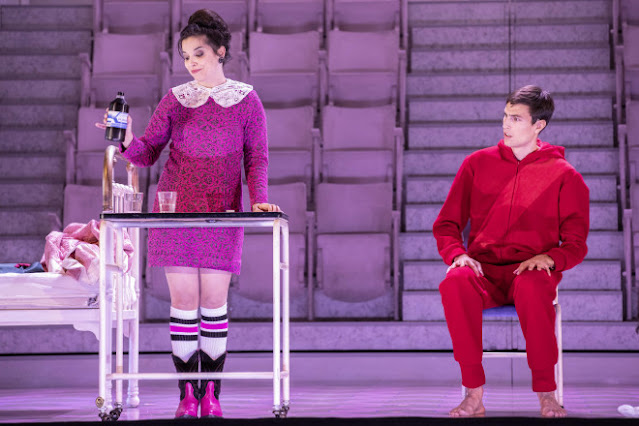Boesmans - On purge bébé !
La Monnaie, Brussels, Sunday December 18 2022
Conductor: Bassem Akiki. Production: Richard Brunel. Sets: Etienne Pluss. Costumes: Bruno de Lavenère. Lighting: Laurent Castaingt. Bastien Follavoine: Jean-Sébastien Bou. Julie Follavoine: Jodie Devos. Aristide Chouilloux: Denzil Delaere. Clémence Chouilloux: Sophie Pondjiclis. Horace Truchet: Jérôme Varnier. Toto: Tibor Ockenfels. Toto (as a child): Martin da Silva Magalhães. La Monnaie Symphony Orchestra.
 |
| Photos: Jean-Louis Fernandez/La Monnaie |
My 2022 operatic agenda ended with On purge bébé, Philippe Boesmans' eighth and last opera (completed after his death in 2021 by his friend Benoît Mernier, with advice from Sylvain Cambreling), at La Monnaie in Brussels: an hour and twenty minutes of sheer, scatological fun, revolving around the enfant roi Toto’s constipation (Toto, short for Hervé we are told, is, by the way, actually seven, not a toddler), a contract for 300,000 chamber pots, and of course (the vaudeville is by Feydeau, after all) a man (the potential buyer, for the army, of the jerries) unwittingly cheated on by his wife. It's a rare and welcome addition to the comic opera catalogue, and also adds a new, coloratura-type rôle, recalling Strauss’s Die schweigsame Frau, composed, if I've understood correctly, specifically for the voice of Jodie Devos. I imagine, too, that this is the first opera to include ‘constipation is no laughing matter’ and ‘baby hasn’t been’ (who remembers Walter in Nearest and Dearest?) in its libretto.
The score, for just 27 instruments, is zippy, sparkling and witty, sometimes cheeky (blatantly quoting the rising 'Grail' chord series from Parsifal when the supposedly unbreakable - it isn't, of course - prototype pot is presented), sometimes lyrically dreamlike, never 'difficult' or boring. It is bookended by references to Mendelssohn’s Hebrides overture: Monsieur Follavoine has been asked by his son where the islands are, and rather than admitting he doesn’t know, is looking them up under ‘Z’, then ‘E’ (in French the ‘H’ is silent). Other stylistic quotations, or at any rate hints, recall Massenet and Strauss.
Richard Brunel, who worked on the opera with Boesmans from the start, abridging Feydeau’s play for the libretto (stripping it, apparently, of a fair number of sexist lines), updates the action to the present. It works: the tension between an ambitious couple’s socio-professional ambitions and their obsession with their only child’s every minor ailment is no less relevant now than in 1910.
The curtain rises on Bébé’s (or Toto’s) dormer bedroom, with its pink-patterned wallpaper, iron bedstead, bedside table, chest of drawers, lamp, and a Tintin-style space poster. There’s a toilet at the rear, and at times toilet paper streams across the stage. This basic set expands as the action progresses, with a door set high up at the back for the various entrances, eventually (a bit too late for Chouilloux, left dangling at the threshold) stairs and, for the presentation, in front of a TV crew, of the pots, terraces of theatre seats. Bébé is played by two actors: one a child and later, refusing to take the purge, the other a lanky, sulky young man, both in red rompers with a built-in royal sash, ton-sur-ton, for the enfant roi. Madame, a woman on the verge of a nervous breakdown, initially appears in a mauve velvet ‘leisure suit’ (half pyjamas, half tracksuit). Follavoine wears a suit and tie - albeit always dishevelled - and Chouilloux a sand-coloured French officer’s uniform and képi, though for various reasons, neither manages to keep his trousers on all the time.
The success of this kind of work depends, I think, on the director’s ability to coach a team of singer-actors into the right madcap spirit and keep up the right madcap pace. In the event, the rapid-fire teamwork was such that it was hard to imagine there were actually two casts, with one or two performers slotting in for alternate performances: it ran like clockwork, wound up tight. Jean-Sebastien Bou brought his usual commitment, energy and charisma to the part of the harrassed businessman/husband, still able to leap up athletically on to a table en un clin d’oeil; ‘Pity the voice is like a coffee grinder’, retorted a friend who doesn’t like him - I’ve never fully understood why. He also, crucially, sang with excellent diction. If Judie Devos’s was, to me, less crisp (though I’ve since read reviews praising her for exactly the opposite), and her voice at time almost strident, she could hardly be blamed, in the stratosphere where Boesmans cruelly dispatches her in the termagent’s more heated - and thus severely demanding - moments; in a more reasonable range she was vivacious and feisty and excellent as usual. Also perfect, totally on top of his role, vocally and theatrically, (including some nifty footwork under a spotlight) was Denzil Delaere. As usual, though his appearance as Madame Chouilloux’ tall, dark, badboy ‘cousin’ was brief, I found Jérôme Varnier a striking stage and vocal presence; Sophie Pondjiclis, less so: she seemed to have a rich, deep alto voice, but was too hard to hear to be sure.
On purge bébé should have no trouble travelling - I see it will be in Lyon, already (it's a coproduction), next summer, and I imagine it will soon - if not already - be online for all to enjoy. As it’s short, houses may want to stage it as half of a double bill, in which case it will be interesting to see what they pair it with. Suor Angelica? Personally, I’m delighted that, contrary to expectations in these grim times, a new ‘opéra bouffe’ has seen the light. Few contemporary composers seem to have enough sense of the theatre to tackle Feydeau, but Boesmans, who said in an intervew just weeks before he died ‘I laugh along with the piece, sometimes I laugh to myself while I’m composing,’ cracked it.
A plot synopsis is available in English on La Monnaie’s website.





Comments
Post a Comment